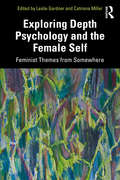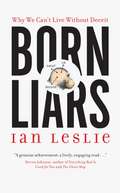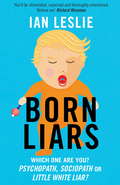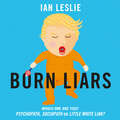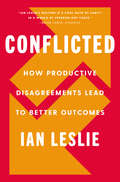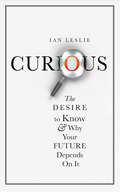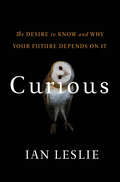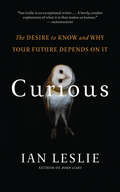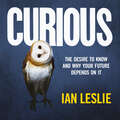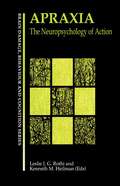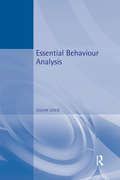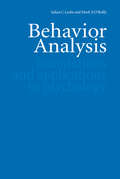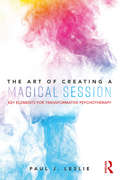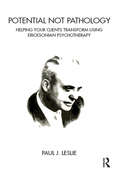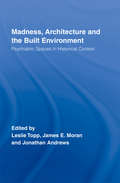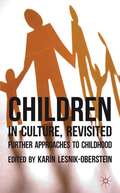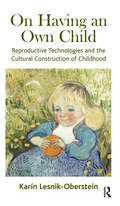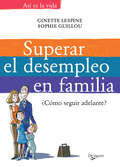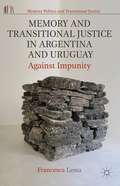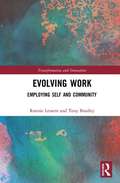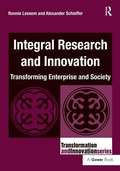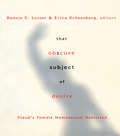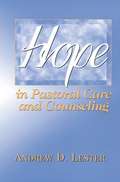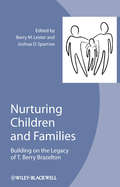- Table View
- List View
Exploring Depth Psychology and the Female Self: Feminist Themes from Somewhere
by Leslie Gardner and Catriona MillerExploring Depth Psychology and the Female Self: Feminist Views from Somewhere presents a Jungian take on modern feminism, offering an international assessment with a dynamic political edge which includes perspectives from both clinicians and academics. Presented in three parts, this unique collection explores how the fields of gender and politics have influenced each other, how myth and storytelling craft feminist narratives and how public discussion can amplify feminist theory. The contributions include some which are traditionally theoretical in tone, and some which are uniquely personal, but all work to encounter the female self as an active entity. The book as a whole offers a multi-faceted and interdisciplinary approach to feminism and feminist issues from contemporary voices around the world, as well as a critique of Jung’s essentialist notion of the feminine. Exploring Depth Psychology and the Female Self will offer insightful perspectives to academics and students of Jungian and post-Jungian studies, gender studies and politics. It will also be of great interest to Jungian analysts and psychotherapists, and analytical psychologists.
Born Liars: Why We Can't Live Without Deceit
by Ian LeslieLying is an intrinsic part of our social fabric, but it is also a deeply problematic and misunderstood aspect of what makes us human. Ian Leslie takes us on a fascinating journey that makes us question not only our own relationship to the truth, but also virtually every daily encounter we have. On the way he dissects the history of the lie detector, how parents affect their children’s attitude to lying (and vice versa), Who Wants to Be a Millionaire?, the philosophical ambiguity of telling the truth, Bill Clinton’s presentational prowess, Wonder Woman’s lasso of truth, and why we should be wary of anyone with more than 150 Facebook friends. Born Liars is thought-provoking, anecdotally driven narrative nonfiction at its best. Ian Leslie’s intoxicating blend of anthropology, biology, cultural history, philosophy, and popular psychology belies a serious central message: that humans have evolved and thrived in large part because of their ability to deceive.
Born Liars: We All Do It But Which One Are You - Psychopath, Sociopath or Little White Liar?
by Ian LeslieWe all do it - how to be a better liar, spot a charlatan and tell the difference between truth and fictionIn Born Liars, Ian Leslie takes the reader on an exhilarating tour of ideas that brings the latest news about deception back from the frontiers of psychology, neuroscience, and philosophy, and explores the role played by lies - both black and white - in our childhoods, our careers, and our health, as well as in advertising, politics, sport and war. Drawing on thinkers as varied as Augustine, Charles Darwin, Sigmund Freud and Joni Mitchell, the author argues that, far from being a bug in the human software, lying is central to who we are; that we cannot understand ourselves without first understanding the dynamics of deceit. After reading Born Liars you'll never think about lies - or life - in quite the same way again.
Born Liars: Why We Can't Live Without Deceit
by Ian LeslieWe all do it - how to be a better liar, spot a charlatan and tell the difference between truth and fictionIn Born Liars, Ian Leslie takes the reader on an exhilarating tour of ideas that brings the latest news about deception back from the frontiers of psychology, neuroscience, and philosophy, and explores the role played by lies - both black and white - in our childhoods, our careers, and our health, as well as in advertising, politics, sport and war. Drawing on thinkers as varied as Augustine, Charles Darwin, Sigmund Freud and Joni Mitchell, the author argues that, far from being a bug in the human software, lying is central to who we are; that we cannot understand ourselves without first understanding the dynamics of deceit. After listening to Born Liars you'll never think about lies - or life - in quite the same way again.(P)2020 Quercus Editions Limited
Conflicted: How Productive Disagreements Lead to Better Outcomes
by Ian LeslieDrawing on advice from the world’s leading experts on conflict and communication—from relationship scientists to hostage negotiators to diplomats—Ian Leslie, a columnist for the New Statesman, shows us how to transform the heat of conflict, disagreement and argument into the light of insight, creativity and connection, in a book with vital lessons for the home, workplace, and public arena.For most people, conflict triggers a fight or flight response. Disagreeing productively is a hard skill for which neither evolution or society has equipped us. It’s a skill we urgently need to acquire; otherwise, our increasingly vociferous disagreements are destined to tear us apart. Productive disagreement is a way of thinking, perhaps the best one we have. It makes us smarter and more creative, and it can even bring us closer together. It’s critical to the success of any shared enterprise, from a marriage, to a business, to a democracy. Isn’t it time we gave more thought to how to do it well?In an increasingly polarized world, our only chance for coming together and moving forward is to learn from those who have mastered the art and science of disagreement. In this book, we’ll learn from experts who are highly skilled at getting the most out of highly charged encounters: interrogators, cops, divorce mediators, therapists, diplomats, psychologists. These professionals know how to get something valuable – information, insight, ideas—from the toughest, most antagonistic conversations. They are brilliant communicators: masters at shaping the conversation beneath the conversation. They know how to turn the heat of conflict into the light of creativity, connection, and insight. In this much-need book, Ian Leslie explores what happens to us when we argue, why disagreement makes us stressed, and why we get angry. He explains why we urgently need to transform the way we think about conflict and how having better disagreements can make us more successful. By drawing together the lessons he learns from different experts, he proposes a series of clear principles that we can all use to make our most difficult dialogues more productive—and our increasingly acrimonious world a better place.
Curious: The Desire to Know and Why Your Future Depends on It
by Ian LeslieA fascinating multi-disciplinary analysis of why curiosity makes the world go round.'A lovely, erudite exploration of what it is that makes us human' - Independent on Sunday'I have no special talents. I am only passionately curious' Albert Einstein. Everyone is born curious. But only some retain the habits of exploring, learning and discovering as they grow older. Which side of the 'curiosity divide' are you on? In Curious Ian Leslie makes a passionate case for the cultivation of our desire to know. Curious people tend to be smarter, more creative and more successful. But at the very moment when the rewards of curiosity have never been higher, it is misunderstood and undervalued, and increasingly practised only by a cognitive elite. Drawing on fascinating research from psychology, sociology and business, Curious looks at what feeds curiosity and what starves it, and uncovers surprising answers. Curiosity isn't a quality you can rely on to last a lifetime, but a mental muscle that atrophies without regular exercise. It's not a gift, but a habit that parents, schools, workplaces and individuals need to nurture if it is to thrive. Filled with inspiring stories, case studies and practical advice, Curious will change the way you think about your own mental life, and that of those around you.
Curious: The Desire to Know and Why Your Future Depends On It
by Ian LeslieToday it seems we have the world at our fingertips. Thanks to smartphones and tools such as Google and Wikipedia, we’re able feed any aspect of our curiosity instantly. But does this mean we are actually becoming more curious? Absolutely not. In Curious, Ian Leslie argues that true curiosity--the sustained quest for understanding that begets insight and innovation--is becoming increasingly difficult to harness in our wired world. We confuse ease of access to information with curiosity, and risk losing our ability to ask questions that extend our knowledge gap rather than merely filling it. Worst of all, this decline in curiosity has led to a decline in empathy and our ability to care about those around us. Combining the latest science with an urgent call to cultivate curious minds, Curious draws on psychology, social history, and popular culture to show that being deeply curious is our only hope when it comes to solving current crises--as well as an essential part of being human.
Curious: The Desire to Know and Why Your Future Depends On It
by Ian LeslieThe latest from Ian Leslie, the author of Born Liars, a Globe and Mail Top 100 Book, is a fascinating look at the human characteristic of curiosity — our extraordinary capacity to take pleasure in discovering, learning, and understanding.Curious shows how the practice of “deep curiosity” — persistent, self-reflective seeking of knowledge and insight — is key to the success of our careers, the happiness of our children, the strength of our relationships, and the progress of societies. But it also argues that it is a fragile quality, which wanes and waxes over time, and that we take it for granted at our peril. Ian Leslie proposes that the Internet is opening up a “curiosity gap,” by exacerbating the divide between those with a large cognitive appetite, and those happy knowing no more than they have to know; between the curious and the incurious. He draws on many sources and stories to illustrate his points: Benjamin Franklin at Portsmouth Harbour studying the effect of oil on choppy waters; a bored Galileo distracting himself in a Pisa cathedral by observing the swinging of a recently lit lamp; Leonardo da Vinci doodling ideas in his notebook; Google co-founder Larry Page’s thoughts on the perfect search engine; the invention of the microwave oven; the advantages of your local bookseller over Amazon’s algorithms; a reassessment of Donald Rumsfeld’s defense strategy, and many more.Rich, textured, and exciting, Curious is a new take on the most absorbing human trait of all.
Curious: The Desire to Know and Why Your Future Depends on It
by Ian LeslieA fascinating multi-disciplinary analysis of why curiosity makes the world go round.'A lovely, erudite exploration of what it is that makes us human' - Independent on Sunday'I have no special talents. I am only passionately curious' Albert Einstein. Everyone is born curious. But only some retain the habits of exploring, learning and discovering as they grow older. Which side of the 'curiosity divide' are you on? In Curious Ian Leslie makes a passionate case for the cultivation of our desire to know. Curious people tend to be smarter, more creative and more successful. But at the very moment when the rewards of curiosity have never been higher, it is misunderstood and undervalued, and increasingly practised only by a cognitive elite. Drawing on fascinating research from psychology, sociology and business, Curious looks at what feeds curiosity and what starves it, and uncovers surprising answers. Curiosity isn't a quality you can rely on to last a lifetime, but a mental muscle that atrophies without regular exercise. It's not a gift, but a habit that parents, schools, workplaces and individuals need to nurture if it is to thrive. Filled with inspiring stories, case studies and practical advice, Curious will change the way you think about your own mental life, and that of those around you.(P)2020 Quercus Editions Limited
Apraxia: The Neuropsychology of Action (Brain, Behaviour and Cognition)
by Leslie J. Gonzalez Rothi Kenneth M. HeilmanThe purpose of this book is to provide the reader with a perspective on apraxia that considers a link between the pathology of apraxia and normal motor skill. In addition, it is the intention of the authors to provide information that is theoretically interesting as well as clinically applicable. The book is a collection of papers by various authors working in the area of apraxia, almost exclusively with limb aparaxia specifically. Beginning with Hugo Liepman's work of the late 19th century, a cognitive neuropsychological model of limb apraxia is reviewed, the use of new technologies that are informative about the mechanisms of limb praxis are discussed, and issues related to research as well as clinical assessment/management of the disorder are provided. While acquired limb apraxia is the focus of the book, there are also chapters on handedness, developmental apraxia of speech, and disorders of handwriting.
Essential Behaviour Analysis (Essential Psychology)
by Julian LeslieSince the so-called 'cognitive revolution' in psychology in the 1960s, it has often been said that 'behaviourism is dead'. This book demonstrates why this is not the case and how the behavioural approach has continued to flourish.Leslie begins by summarising the behavioural approach to psychology and shows how it differs from other contemporary and cognitive approaches. The basic principles of the discipline are outlined and linked to major areas of interest and importance, such as behavioural neuroscience, resolution of human behavioural problems, and human language and cognition.Behaviour analysis is thus shown to contribute to our developing understanding of the relationship between brain systems and psychological problems, to provide an effective and scientifically based approach to human behavioural problems and to deal with topics central to modern psychology.
Behavior Analysis: Foundations and Applications to Psychology
by Julian C. Leslie Mark F. O'ReillyThis psychology textbook offers a comprehensive examination of the basic principles of behavior analysis and their application to issues of social significance.Behavioral scientists are interested in elucidating the fundamental principles that govern the behavior of human and non-human animals. Behavior Analysis is designed to meet the needs of senior undergraduate courses and postgraduate training in behavior analysis and its applications.The eleven comprehensive chapters:·consider how fundamental principles of behavior can be used in an applied setting to identify behavior to be changed, to select treatments which increase of decrease behavior, and to evaluate the effectiveness of interventions; and·give examples from various disciplines, including dietetics, education, occupational therapy, and speech therapy, as well as clinical, social, health and community psychology.In addition to covering core material essential for courses in psychology, this volume will also provide a useful account of behavioural psychology and its applied uses for students and professionals from a wide range of fields.
When A Stranger Calls You Mom
by Katharine LeslieA child development and relationship perspective on why traumatized children think, feel and act the way they do.
The Art of Creating a Magical Session: Key Elements for Transformative Psychotherapy
by Paul J. LeslieRecent research has repeatedly confirmed that it is not the technique nor the theory, but the interaction between therapists and clients that creates change in clients. This practical guide outlines the ways in which psychotherapists can find new methods of moving their therapy sessions toward dynamic, healing interactions by shifting away from an overreliance on techniques and theories. The Art of Creating a Magical Session discusses the key elements needed to create the interaction conditions for transformational therapeutic change to occur. Using a conceptual approach to client transformation, the book draws from a diverse range of sources including indigenous traditions and rituals, as well as the latest research on the common factors that contribute to success in the therapy room. Each chapter focuses on educating and inspiring mental health professionals to easily adapt and apply creative and resourceful approaches to help their own clients begin inner transformations. With case studies and narratives woven throughout, this accessible guide will support mental health practitioners as they approach their practice in new ways and achieve deeper, and more magical, therapy sessions. It will be valuable reading for psychotherapists, psychologists, social workers and counselors.
Potential Not Pathology: Helping Your Clients Transform Using Ericksonian Psychotherapy
by Paul J. LeslieThis book is designed to assist counsellors who would like to use and understand the psychotherapeutic strategies of Milton Erickson but often find it confusing, intimidating or unrealistic. Using colourful case studies and stories told in everyday language, this work will educate and help professionals in being able to understand how to adapt and apply creative and resourceful therapy interventions based on the concepts of Ericksonian psychotherapy. It will also assist clinicians and therapists in easily implementing the concepts of Ericksonian psychotherapy into their work in order to energise and revitalise their therapy sessions. Subjects explored include client resistance and client potential, the role of imagination and playfulness in the therapeutic work, and the healing possibilities hidden within stories and metaphors.
Madness, Architecture and the Built Environment: Psychiatric Spaces in Historical Context (Routledge Studies in the Social History of Medicine)
by Leslie Topp; James E. Moran; Jonathan AndrewsThis is the first volume of papers devoted to an examination of the relationship between mental health/illness and the construction and experience of space. This historical analysis with contributions from leading experts will enlighten and intrigue in equal measure. The first rigorous scholarly analysis of its kind in book form, it will be of particular interest to the history, psychiatry and architecture communities.
Children in Culture, Revisited
by Karín Lesnik-ObersteinChildren in Culture, Revisited follows on from the first volume, Children in Culture , and is composed of a range of chapters, newly written for this collection, which offer further fully inter- and multidisciplinary considerations of childhood as a culturally and historically constructed identity rather than a constant psycho-biological entity.
On Having an Own Child: Reproductive Technologies and the Cultural Construction of Childhood
by Karin Lesnik-ObersteinHow are ideas of genetics, 'blood', the family, and relatedness created and consumed? This is the first book ever to consider in depth why people want children, and specifically why people want children produced by reproductive technologies (such as IVF, ICSI etc). As the book demonstrates, even books ostensibly devoted to the topic of why people want children and the reasons for using reproductive technologies tend to start with the assumption that this is either simply a biological drive to reproduce, or a socially instilled desire. This book uses psychoanalysis not to provide an answer in its own right, but as an analytic tool to probe more deeply the problems of these assumptions. The idea that reproductive technologies simply supply an 'own' child is questioned in this volume in terms of asking how and why reproductive technologies are seen to create this 'ownness'. Given that it is the idea of an 'own' child that underpins and justifies the whole use of reproductive technologies, this book is a crucial and wholly original intervention in this complex and highly topical area.
Superar el desempleo en familia
by Ginette Lespine Sophie GuillouHoy en día el desempleo afecta cada vez a un mayor número de familias. A menudo, trastorna su equilibrio y desestabiliza a la pareja. Por eso, es importante entender lo que pasa en la cabeza de cada uno, tanto del afectado directamente, como de su pareja e hijos, ya sean pequeños o mayores.
Memory And Transitional Justice In Argentina And Uruguay
by Francesca LessaExisting memory studies literature has tended to focus on commemorative sites and dates while transitional justice scholarship has primarily centered on truth commissions, trials, and reparations. This book explores the interaction between memory and transitional justice and develops a theoretical framework for bringing these two fields of study together through the concept of critical junctures. Focusing on post-dictatorship Argentina and Uruguay, Francesca Lessa uses critical junctures to track and explain moments of change. She traces and analyzes across time the dynamic evolution of and shifts in transitional justice policies and the emergence and replacement of dominant memory narratives in the context of enduring struggles for justice and against impunity.
Evolving Work: Employing Self and Community
by Ronnie Lessem Tony Bradley<p>The idea of Self and the authenticity of particular identities have been rapidly dissolving in the acids of post-modern globalising capitalism. The hegemony of patterns of work, wage-labor and the operation of labour markets in the American West (and European North) has ridden rough-shod over distinctive ways of enabling communities to flourish in many parts of the Southern and Eastern worlds (Global South). But, this is not inevitable. Indeed, as this book indicates, there are many practical examples across the globe – that connect with some of the most significant theoretical challenges to the operation of dehumanising work – which reveal that a profound reversal is taking place. As such, the core theme of this book is to show that a movement is occurring whereby self-employment can be transformed into communal work that employs the Self in ways that release the authentic vocations of people, individually and collectively. <p>The approach taken in these chapters traverses the globe, utilising the original ‘integral worlds’ model that will be familiar to students of the Trans4M/Routledge Transformation and Innovation series, developed over more than a decade. Such a standpoint points the way to the release of particular social and economic cultures in each of what we term the four "realities" or "worldviews" of South, East, North and Western worlds. In this book we use the methodology of GENEalogy – identifying the realms associated with each world – to show how the rhythms, that is Grounding, Emergence, Navigation and Effect, of each is leading to greater economic, social and spiritual freedom for individuals, organisations, communities and, indeed, entire societies.</p>
Integral Research and Innovation: Transforming Enterprise and Society
by Ronnie Lessem Alexander SchiefferAt a time when business practitioners and others responsible for organizational development are desperate for usable knowledge the authors of this book contend that social science research is failing to support business and management. In Integral Research and Innovation, they explain how research has to be transformative, rather than just informative if it is to contribute usefully to building integrated and sustainable enterprises. Drawing on their experience of environments where researchers and practitioners do engage constructively, resulting in research that is active, participative, and genuinely innovative, Professor Lessem and Dr Schieffer are in territory that is far beyond that covered by standard works on research methodology.
That Obscure Subject of Desire: Freud's Female Homosexual Revisited
by Ronnie C. Lesser Erica SchoenbergAn interdisciplinary collection of papers on Freud's sixth and final case psychogenesis of a case of homosexuality in a woman. To date this case has received very little attention, which can be seen as a sign of the marginalization of lesbians in both psychoanalytic theory and culture. This text seeks to rectify this neglect, providing a forum where questions surrounding this case can be discussed. This edition first published in 1999. Routledge is an imprint of Taylor & Francis, an informa company.
Hope in Pastoral Care and Counseling
by Andrew D. LesterThis book focuses on clinical theories and methods for pastoral assessment of intervention with those who despair and offers a corrective measures to these stories through deconstruction, re-framing, and reconstruction.
Nurturing Children and Families
by Barry M. Lester Joshua D. SparrowThis volume celebrates the work and influence of T. Berry Brazelton, one of the world's foremost pediatricians, by bringing together contributions from researchers and clinicians whose own pioneering work has been inspired by Brazelton's foundations in the field of child development. Includes contributions from experts influenced by the work of Brazelton from a wide range of fields, including pediatrics, psychology, nursing, early childhood education, occupational therapy, and public policyProvides an overview of the field of child development, from the explosion of infant research in the 1960s to contemporary studiesOutlines the achievements and influence of T. Berry Brazelton, one of the world's foremost pediatricians, and his lasting influence in continuing research, practice, and public policy
